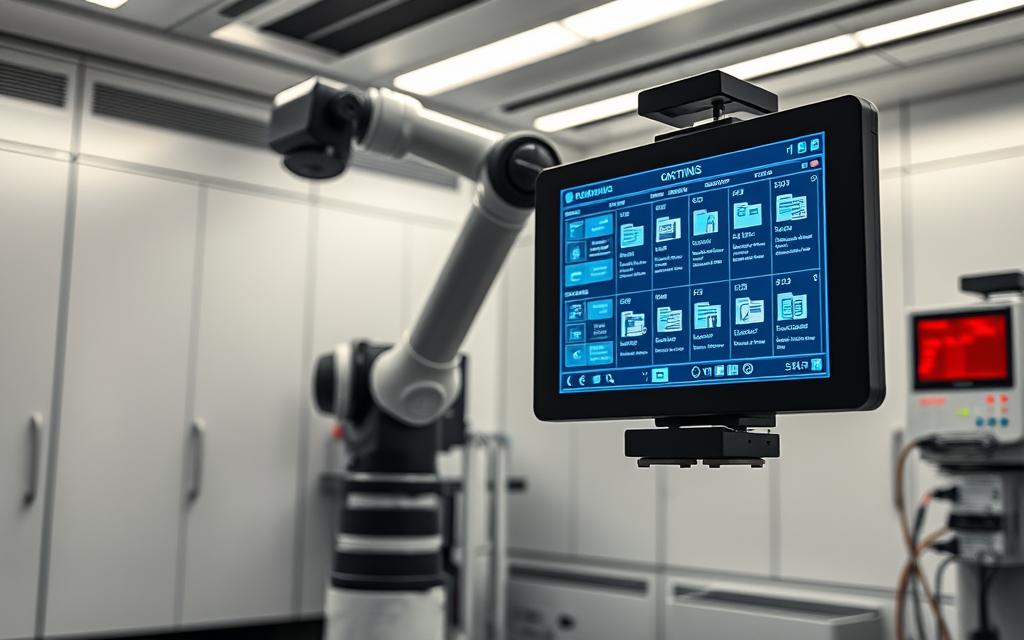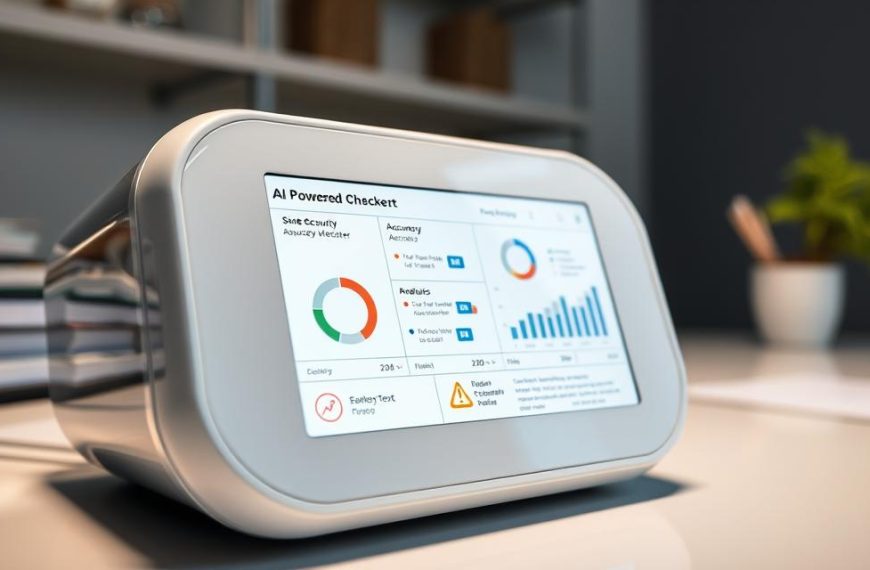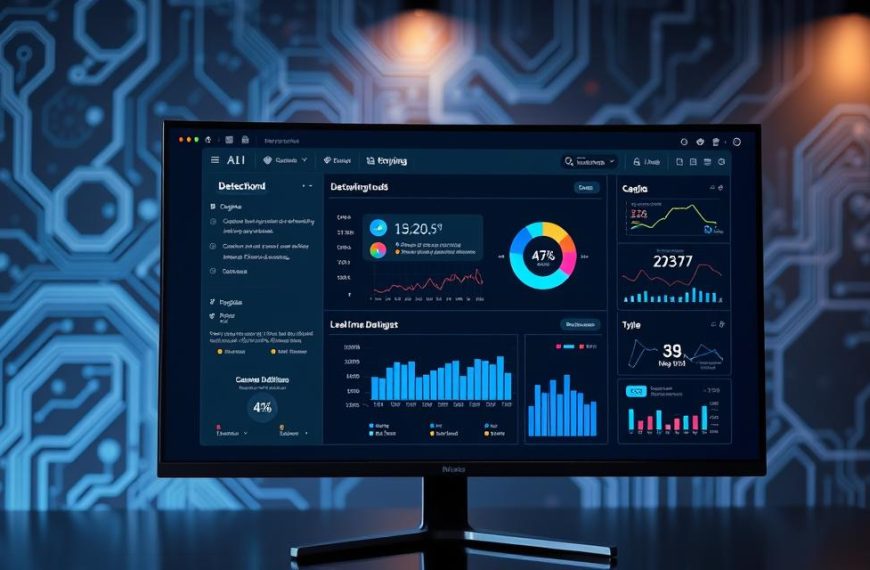The rise of AI-generated content has made it increasingly difficult to distinguish between human-written and machine-generated text. As a result, content authenticity verification has become essential for businesses, educators, and content creators.
With the growing importance of content detection, various tools and technologies have emerged to help verify the authenticity of digital content. These tools utilise advanced algorithms to detect the nuances of human writing and identify potential content generated by machines.
By leveraging these detector tools, individuals and organisations can ensure transparency and maintain trust in the digital landscape. This article will explore the different detection technologies and services available, providing readers with practical ways to verify content authenticity.
Understanding the Need for AI Content Detection
The increasing prevalence of AI-generated content has made detection a critical concern. As advanced language models like GPT-4, Claude, and Gemini continue to evolve, they are revolutionising the way content is created.
The Rise of AI-Generated Content
AI-generated content is growing exponentially across various platforms and industries. Advanced language models are capable of producing high-quality content that rivals human-created text.
Challenges in Distinguishing Human vs. AI Writing
The increasing sophistication of AI writing makes it challenging to distinguish from human-created content. AI models are trained on vast datasets, enabling them to mimic human writing styles.
This blurring of lines between human and AI-generated content necessitates reliable detection methods. The potential implications of undisclosed AI-generated content are significant, affecting educators, publishers, and content platforms.
How AI Check Technology Works
Understanding how AI Check technology works requires delving into its core components. At its heart, AI Check technology relies on sophisticated algorithms to detect whether a piece of content is generated by humans or AI.
Pattern Recognition in AI Detection
AI detection systems utilise pattern recognition algorithms to identify statistical regularities in AI-generated text. These algorithms are designed to analyse patterns and linguistic features that are characteristic of AI-generated content.
Machine Learning Models Behind Detection
The machine learning models powering detection systems are trained on vast datasets, enabling them to learn from examples and improve over time. The learning process involves adjusting the model parameters to minimise errors in detection.
The detection model is continually updated to stay abreast of advancements in AI content generation, ensuring it remains effective in distinguishing between human and AI-generated text.
Benefits of Using AI Content Detectors
The integration of AI content detectors has revolutionised the way we approach content authenticity. These detectors offer numerous benefits across various contexts, enhancing the overall quality and trustworthiness of digital content.
Maintaining Content Integrity
AI content detectors help maintain content integrity by verifying the authenticity of digital content. This is crucial in ensuring that the information presented is genuine and not manipulated or generated by AI without disclosure.
Building Trust with Your Audience
By using AI content detectors, organisations can demonstrate transparency about AI use, thereby building trust with their audience. This transparency is key to fostering a loyal customer base and enhancing brand reputation.
The primary advantages of implementing AI content detection include:
- Enforcing content policies consistently across all platforms
- Improving overall content strategy through user feedback on detected content
- Gaining a competitive advantage by demonstrating a commitment to authentic content
- Identifying inappropriate use of AI in sensitive contexts
- Supporting brand reputation and credibility in the digital space through maintained integrity
By leveraging AI content detectors, organisations can ensure that their digital content is not only authentic but also compliant with their content policies, thereby enhancing trust among their users.
Common Use Cases for AI Check Services
With the rise of AI-generated content, AI check services have emerged as a crucial tool for verification. These services are being adopted across various sectors to ensure the authenticity and integrity of content.
Academic Integrity Verification
Educational institutions utilise AI check services to maintain academic integrity. By detecting AI-generated content, these institutions can prevent plagiarism and ensure that students’ work is original.
Professional Content Verification
In professional settings, such as journalism and publishing, AI check services help verify the authenticity of content before publication. This ensures that the content is trustworthy and maintains the publication’s credibility.
The use of AI check services extends to businesses and content platforms, where they help in maintaining compliance with disclosure requirements and enforcing terms of service. By identifying the original source of content, AI checks also aid in preventing copyright infringement.
Overall, AI check technology plays a vital role in maintaining the integrity of text and writing across different industries, ensuring that the content consumed by audiences is authentic and reliable.
ZeroGPT: Advanced AI Content Detection
ZeroGPT is at the forefront of AI-generated content detection, leveraging its proprietary DeepAnalyse™ Technology to achieve high accuracy rates. This advanced technology employs a multi-stage methodology designed to optimise detection accuracy while minimising false positives and negatives.
DeepAnalyse™ Technology Explained
DeepAnalyse™ Technology is a comprehensive deep learning methodology trained on extensive text collections from the internet, educational datasets, and proprietary synthetic AI datasets produced using various language models. This enables ZeroGPT to identify AI-generated content from sources like ChatGPT, GPT-3, GPT-5, Gemini, and LLaMa models.
Multi-Platform Accessibility
ZeroGPT is accessible across multiple platforms, including WhatsApp and Telegram, allowing users to detect AI-generated content, summarise, paraphrase, translate, and check for grammar errors. This multi-platform accessibility enhances the tool’s usability and versatility, making it a valuable resource for various users.
The detector uses a vast amount of data to improve its detection capabilities, ensuring a high rate of accuracy in identifying AI-generated content.
GPTZero: Cross-Model Detection Capabilities
GPTZero’s cross-model detection capabilities set a new standard in AI content verification. Its advanced technology enables the detection of AI-generated content across a wide range of models.
Wide Range of Supported AI Models
GPTZero works across multiple AI language models, including ChatGPT, GPT-5, GPT-4, GPT-3, Gemini, Claude, Llama, and Deepseek. This comprehensive support ensures that GPTZero can detect content from various AI sources.
Training Data and Accuracy Rates
GPTZero’s detection model has been updated with the latest training data, including documents from OpenAI, Gemini, and Claude. This update has enhanced the accuracy rate of GPTZero’s detection capabilities, ensuring a high level of precision regardless of the AI model used to generate the content.
The technical approach behind GPTZero involves sophisticated machine learning algorithms that enable it to identify patterns in AI-generated content. By continually updating its training data, GPTZero maintains a high accuracy rate across different AI language models.
As AI language models continue to evolve, GPTZero faces the challenge of maintaining its detection accuracy. However, its robust training methodology and cross-model detection capabilities position it as a leader in AI content detection.
Grammarly’s AI Detection Features
With its sophisticated AI detection model, Grammarly provides an effective means of distinguishing between human and AI-generated content. Grammarly’s AI detector tool displays a percentage that indicates how much of the text provided appears AI-generated, as assessed by their detection model.
Beyond Simple Detection
Grammarly’s capabilities extend far beyond mere AI detection. The platform offers a suite of tools including grammar checking, plagiarism detection, and citation generation, making it a comprehensive writing assistant.
Integration with Writing Tools
Grammarly’s AI detection feature is seamlessly integrated with its other writing tools. The Authorship feature automatically categorizes text as you write based on its origin, providing a shareable report and replay feature that shows the document’s creation process.
The integration of AI detection within Grammarly’s broader writing assistance platform enhances the overall writing experience. It not only helps in maintaining content integrity but also aids in building trust with the audience.
Our AI Check Service Advantages
In the realm of AI-generated content detection, our service is a game-changer, offering unparalleled accuracy and reliability. Our AI check service is designed to provide top-notch detection capabilities, setting a new standard in the industry.
High Accuracy Detection Rates
Our service boasts high accuracy detection rates across various types of AI-generated content. This is achieved through our advanced content detector technology, which is continually updated to stay ahead of emerging AI trends. The result is a detection rate that is among the highest in the industry.
| Detection Type | Accuracy Rate |
|---|---|
| AI-generated text | 95% |
| Human-written text | 98% |
Comprehensive Analysis Reports
Our service provides detailed analysis reports that offer insights into detected content. These reports are designed to help users understand the text they’ve submitted, including its authenticity and potential risks. By leveraging our detection technology, users can make informed decisions about their content.
“The accuracy of our AI check service is unparalleled, providing users with the confidence they need to trust their content detection results.”
With our service, users benefit from a user-friendly interface, multi-model detection capabilities, and continuous model updates that maintain accuracy as AI evolves. By minimizing false positives while maintaining sensitivity, our detection technology gives users a reliable solution for content verification.
Understanding AI Detection Accuracy
Understanding the nuances of AI detection accuracy is essential for evaluating content originality. AI detection tools are not foolproof and can vary in their accuracy based on the algorithms used and the specific characteristics of the text being analyzed.
While AI detectors can help assess whether text appears to be AI-generated, currently, there is no AI detector that can conclusively or definitively determine whether AI was used to produce text.
Factors Affecting Detection Precision
Detection precision is influenced by several factors, including text length and complexity. Longer texts with complex structures can be more accurately analyzed, while shorter texts may pose challenges for detection models.
Dealing with False Positives
False positives can have a significant impact on legitimate content, potentially leading to incorrect assumptions about its origin. To minimize false positives, it’s crucial to use detection tools as part of a holistic approach to content evaluation, considering multiple factors beyond just detection results.
As
“The accuracy of AI detection tools should be considered in the context of their limitations and the specific characteristics of the content being analyzed.”
This approach allows for a more comprehensive understanding of content originality.
Key considerations include examining the concept of accuracy in AI content detection, detailing factors that influence detection precision, and discussing strategies for minimizing false positives. By understanding these aspects, users can effectively utilize AI detection tools as part of their content evaluation workflow.
Multilingual AI Content Detection
As AI-generated content becomes increasingly prevalent, the need for multilingual AI content detection has never been more pressing. With the global proliferation of content, detecting AI-generated text across various languages is crucial for maintaining content integrity.
Language Support Capabilities
Leading AI detection systems, such as ZeroGPT, support multiple languages, enabling users to verify the authenticity of content worldwide. This capability is essential for organisations operating globally, ensuring that their content meets the required standards across different regions.
Cross-Language Detection Challenges
Detecting AI-generated content across different languages poses significant challenges, including variations in patterns and linguistic features. To overcome these challenges, detection models must be trained on diverse datasets to improve their accuracy and reliability.
AI Check for Different Content Types
AI detection approaches vary significantly across different content types and writing styles. The effectiveness of AI check technology depends on understanding these differences to provide accurate results.
Academic Papers and Essays
Detecting AI-generated content in academic papers and essays requires a nuanced approach. These documents often involve complex arguments and technical vocabulary, making it challenging to distinguish between human and AI-generated content. “The line between legitimate research and AI-generated text is increasingly blurred,” notes a recent study on AI in academia.
Marketing and Web Content
Marketing content presents unique challenges due to its creative and often persuasive nature. AI detection systems must be able to identify AI-generated marketing text while understanding the context and intent behind the content. Effective detection in this area helps maintain originality and reduces plagiarism.
Integrating AI Check into Your Workflow
Enhancing your workflow with AI content detection capabilities can revolutionise your content management. By integrating AI check tools, organisations can ensure the authenticity and integrity of their content.
API Access for Organisations
ZeroGPT’s team has developed a user-friendly API for organisations, enabling seamless integration of AI detection tools into existing workflows. The API is available for various tools, including the AI Detector, Plagiarism Checker, and Grammar and Spell Checker. For more information on integrating AI into workflows, visit Flowster’s guide on AI integration strategies.
Batch Processing Capabilities
ZeroGPT also offers batch files upload, allowing users to upload multiple files at once, which are then automatically checked in the dashboard. This feature significantly enhances the efficiency of content verification processes.
| Feature | Description | Benefit |
|---|---|---|
| API Access | User-friendly API for organisations | Seamless integration with existing workflows |
| Batch Processing | Upload multiple files at once | Efficient content verification |
| AI Detection Tools | Range of tools including AI Detector and Plagiarism Checker | Comprehensive content analysis |
Responsible Use of AI Detection Tools
The use of AI detectors raises important questions about the balance between detection integrity and writing diversity. As AI-generated content becomes more prevalent, it is crucial to consider the ethical implications of using these tools.
Ethical Considerations
AI detection tools must be used in a way that respects the diversity of writing styles. This includes being aware of the potential biases in detection systems and taking steps to mitigate them. An ethical approach involves transparency about the use and limitations of these tools.
Avoiding Bias in Detection
To avoid bias, AI detectors must be trained on diverse datasets that account for various writing styles, including those of non-native English speakers. Grammarly’s commitment to building models with quality datasets that undergo comprehensive evaluations for bias and fairness is a step in the right direction. User feedback also plays a crucial role in refining these models.
By acknowledging the potential pitfalls of AI detection tools and adopting a responsible approach, we can maintain integrity in content creation while promoting diversity in writing styles.
Future of AI Content Detection
The future of AI content detection is rapidly evolving, driven by advancements in AI generation and the need for more sophisticated detection methods. As AI-generated content becomes increasingly prevalent, the development of AI content detection technologies is gaining momentum.
Evolving Detection Technologies
New detection technologies are emerging to tackle the challenges posed by AI-generated content. These include the development of more advanced models that can analyze complex patterns in text and identify subtle cues that indicate AI-generated content.
The Arms Race Between Generators and Detectors
The ongoing “arms race” between AI generators and detectors is pushing the boundaries of what is possible in content detection. As AI generators become more sophisticated, detectors must also evolve to keep pace.
| Technological Advancements | Impact on Detection |
|---|---|
| Advanced Machine Learning Models | Improved accuracy in detecting AI-generated content |
| Increased Use of Watermarking | Enhanced ability to identify AI-generated content |
| Larger and More Diverse Training Data | Better detection capabilities across various content types |
The future of AI content detection will be shaped by the interplay between technological advancements, regulatory developments, and the evolving landscape of AI-generated content. As the field continues to evolve, we can expect to see more sophisticated detection methods and a greater emphasis on data-driven approaches.
Getting Started with Our AI Check Service
Getting started with our AI Check service is straightforward, with a simple setup process designed for both individual users and organisations. Our service is designed to be user-friendly, allowing you to quickly verify the authenticity of your content using our advanced content detector.
Simple Setup
The setup process is designed to be intuitive, requiring minimal technical expertise. Users can easily navigate our interface to begin detecting AI-generated content in their text.
Subscription Options
We offer various subscription options to meet different detection needs, with key features included in each tier. Our flexible plans allow you to use our service according to your specific requirements, ensuring you get the most out of our AI Check service.
By choosing our AI Check service, you can trust that you’re getting a reliable and efficient way to verify the authenticity of your text.
Conclusion
With AI-generated text on the rise, the need for reliable content verification has never been more pressing. Our article has explored the intricacies of AI content detection, highlighting its importance in maintaining trust and integrity. By leveraging AI check services, individuals and organisations can ensure the authenticity of their writing. As detection technology evolves, ongoing vigilance is crucial. Our AI check service offers high accuracy detection rates and comprehensive analysis reports, making it a superior choice. We recommend implementing effective content verification practices to maintain transparency and trust.




















